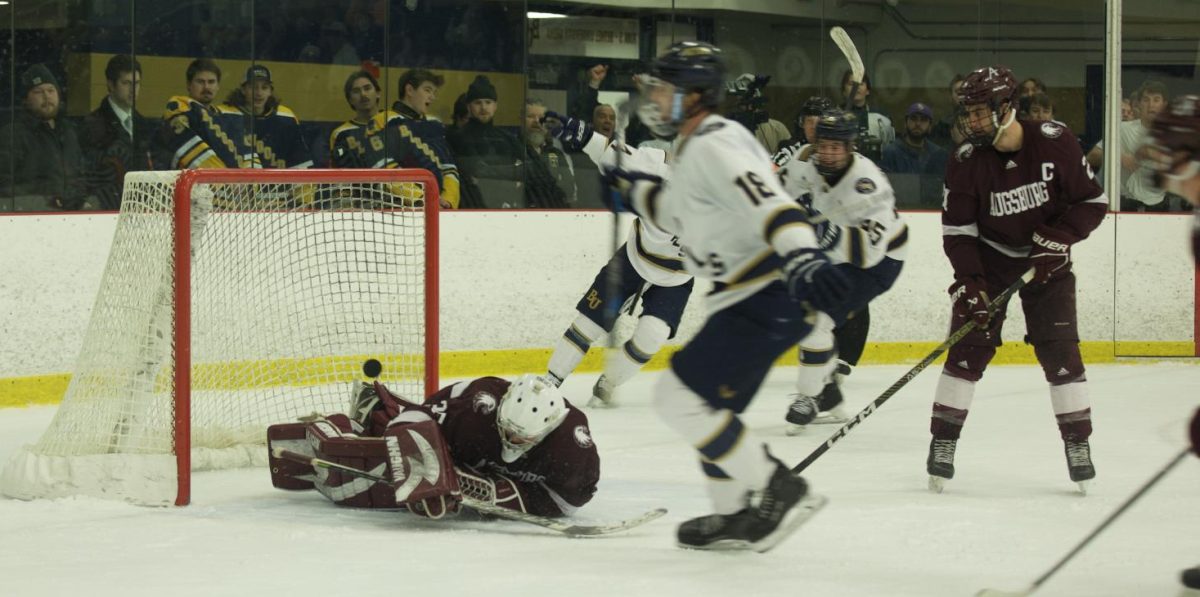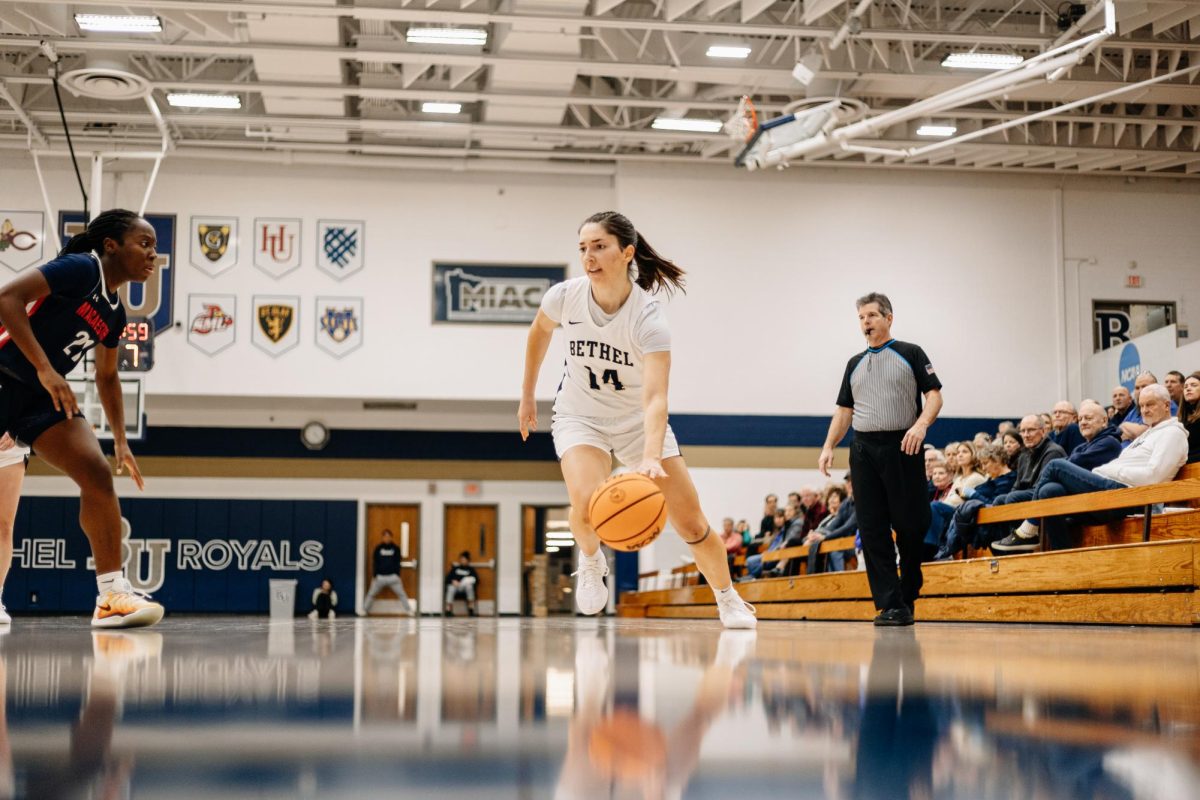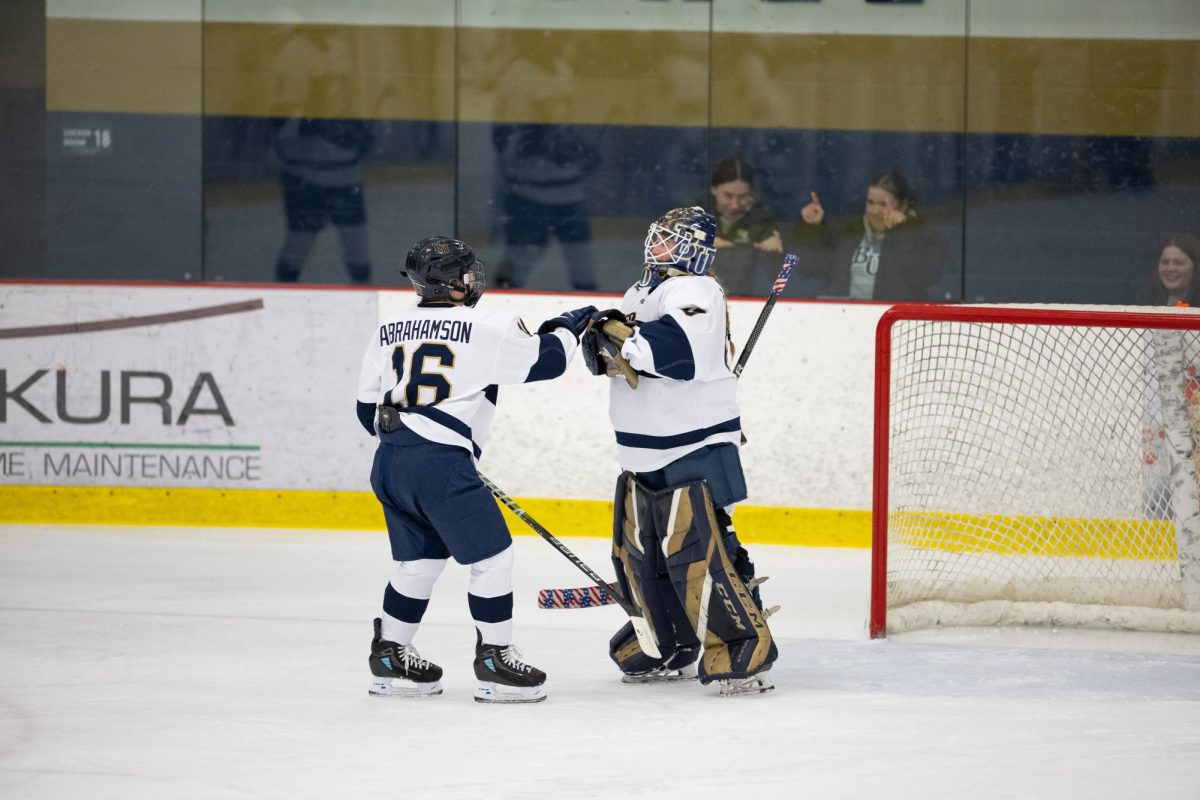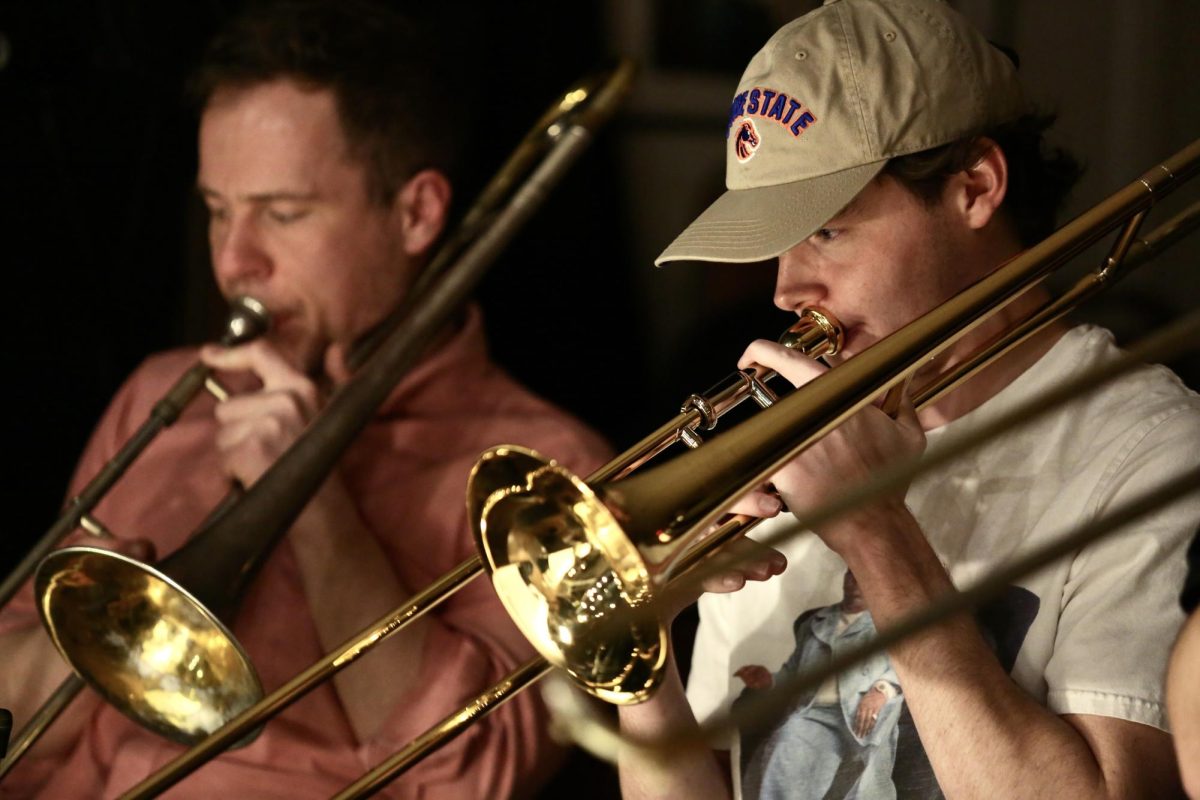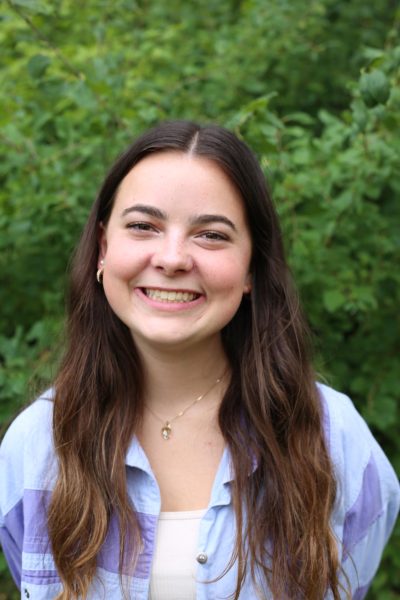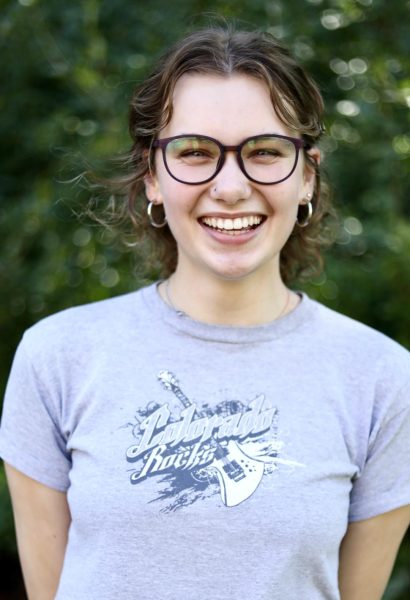Musicians file on and off of the stage at Whitey’s Old Town Saloon in Minneapolis, perching on barstools at various high-top tables near the front while they wait to get in on the action of a jazz jam session. The crowd bobs heads and taps feet in approval, applauding after every trombone, trumpet or tap dancing solo.
Among them are a group of students from Bethel University, filling up a table near the back underneath the large mermaid statue staring at the crowd from above the bar, sharing cheese curds while they wait for Bethel senior Christian Swenson to get a chance to play.
When Swenson finally steps onto the stage — whether that’s on the trumpet, drums or something else — he lets go, and jazz takes over.
“Every time I come there, I’m a little bit better,” Swenson said. “It’s a cool thing to grow with these different people.”
Swenson has been playing with Bethel’s jazz band for four years and is now on track to make his music into a career. When he was in fifth grade, Swenson picked the trombone because he liked the funny noises he could make with the slide and wanted to join band because his friends were involved. While auditioning for Eden Prairie High School’s wind ensemble before his senior year, he didn’t think at the time that music would be something he could take so seriously.
In March 2020, when his senior year was halted because of the global COVID-19 lockdown, Swenson began to dabble in trumpet. He thought it would be a side career, something that could keep him occupied during quarantine.
Originally a biology major planning on going pre-med, Swenson added a music minor for fun, but as he got more involved with music at Bethel, he had to consider which he was more passionate about — understanding the human body or understanding instruments.
“I didn’t think I would be happy if I had to stop doing music, even for a little bit,” Swenson said.
Now a senior applied performance and composition major, Swenson stands in the back of the Bethel University jazz band playing the trumpet — often the lead instrument in jazz. He plays with a gold Schagerl Apredato mouthpiece, a gift from his grandmother, which is filled with water to reduce unnecessary friction while playing.
Swenson’s first jazz “jam session” was the Eau Claire Jazz Fest in 2022, in which he learned the song he was going to play — “Oleo” by Miles Davis — as he was waiting to go on stage. Since then, Swenson has played at a variety of gigs in and around the Twin Cities. Most Tuesday nights he’s found at Jazz Central Studios in Minneapolis or Whitey’s right around the corner — sometimes hitting up both in one night.
Jam sessions at Whitey’s have unlimited potential, but that also means unlimited potential for things to go wrong. There are no set songs or artists, and musicians gather around tables all throughout the bar waiting for an opportunity to play.
Swenson’s growing list of gigs includes Taste of Minnesota, Turf Club in St. Paul, various graduation parties, weddings and even a Johnny Cash tribute show in Chicago that he had to turn down because of a concert band trip during spring break. The director had threatened to fail him if he missed any of the Bethel trip.
After his first time attending a Jazz Central performance, Swenson ended up talking to a trombone player afterward and inquiring about lessons. The trombone player, Pete Enblom, had 45 years of professional trombone experience and was more than willing to mentor Swenson. Swenson soon learned to put himself out there for more opportunities, making connections in the jazz scene through both Enblom and Bethel’s Director of Jazz Orchestras Jason Harms.
When Harms first met Swenson as a freshman, he knew Swenson had great potential. Describing Swenson as an “excited, happy puppy” in terms of his enthusiasm for jazz, Harms admits Swenson has needed little external motivation in his pursuit of music. In their four years together, Harms has taught Swenson the value of jazz as a Christian and its uniqueness as a style of music.
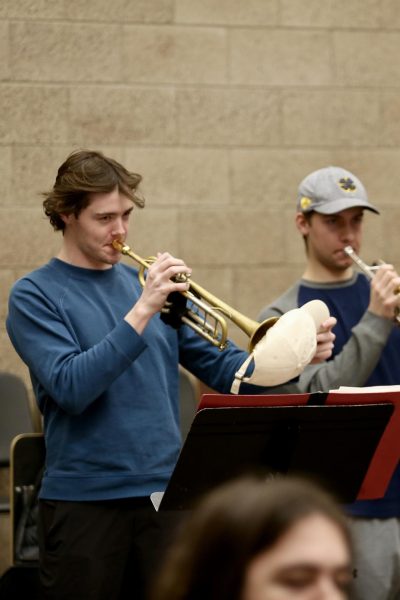
“[Jazz] is not recitation, it’s creation. That’s what makes the music so enjoyable,” Harms said.
According to both Harms and Swenson, there are many ways jazz intersects with Christianity. A primary one is the creativity and fellowship that goes into the performances. As a Christian, Harms has a deep appreciation for the beauty that is created when any number of players come together to create meaningful sound, an appreciation that he has now passed on to Swenson.
“It’s all to the glory of the one who created us, when we … find something that is such a delight and then have the opportunity to labor in that,” Harms said. “Especially when it has the factor of watching others awaken into those pleasures.”
When Swenson has something on his mind, he plays jazz. When something is going wrong, he plays jazz. When he wants to feel good, he plays jazz. Swenson says jazz allows him to feel certain emotions with certain songs.
“Jazz just always makes me smile,” Swenson said. “It’s sort of like a therapy.”
After listening to musicians play on YouTube, sometimes Swenson has ideas at all hours of the night, including 4 a.m. epiphanies that can’t wait until after the sunrise. He’ll run downstairs to his parents’ soundproof basement to play it on one of the instruments hanging on the slatwall in the corner. The bass, trumpet, trombone, piano, clarinet, drums, saxophone, flute, oboe — name an instrument, and Swenson has probably tried playing it.
Swenson has always been able to easily get the hang of playing a new instrument, but finds pride in how he plays swing. Derived in the late 1920s, swing jazz music places its emphasis on the off-beat in any song.
For Swenson, the hardest part of jazz is that musicians can, essentially, play whatever they want. Sometimes he has to focus on playing what fits into a song nicely versus what sounds “hip.” People who aren’t trained to listen to complicated jazz melodies can miss some of the technically difficult elements that are impressive to the right ear.
He recalls playing a song for his dad in the car, hearing a cool part, and rewinding for him to hear it. His dad listened, ear poised, but was still waiting for the part Swenson had mentioned when it had come and gone.
In one instance, Harms introduced Swenson to a new jazz record. Swenson came to Harms a week later with the piece transcribed straight from the record. Much of jazz is focused on conversation between the notes and among the sections of instruments, and Harms says Swenson’s biggest strength is understanding those conversations.
“[Jazz] is just another language, I guess,” Swenson said. “If you don’t understand the language, you’re not going to understand what they’re saying.”
When the Bethel Wind Symphony toured the Baltics in June 2023, one of their stops was Estonia, with few in attendance at their concert understanding English. Despite this language barrier, Swenson recalls one woman in the front row crying after one of their songs. She gave their director flowers and was visibly moved by the music they had created.
“It was a really big ‘music is a universal language’ moment,” Swenson said. “You don’t even have to know how to talk. You just have to know how to feel.”
In order to have an advanced understanding of a new language, research estimates around 1,100 hours need to be spent learning it. For Swenson, spending more than six hours a day playing instruments is no sweat — when he has that much time, he thrives.
He bounces between his parents’ basement or his car in the garage when at home, but on-campus practice spaces are a different story — one that often starts with his roommates telling him to shut up. Swenson sometimes sleeps in late, therefore not practicing until late, when other roommates might be trying to sleep.
“The other roommates do like to give him some crap about it but at the end of the day, it’s fine. We’re used to it, and he’s good,” said Eric Puumala, one of Swenson’s roommates for the last two years.
Puumala first met Swenson when they were on opposite sides of the Bethel concert band together freshman year, Swenson with the trombones and Puumala the euphoniums, a medium-sized brass instrument. Being the only other “musically inclined” roommate, Swenson often goes to Puumala when he has something exciting to share while playing, arranging or composing.
When practicing, Swenson can go between the trumpet, trombone, bass and saxophone for a span of five or more hours as he keeps getting new ideas. His roommates enjoy listening to him play for the most part, but the storage of instruments in the dorms on campus can be tricky.
Last year, when they lived in a suite in Lissner Hall, the living room walk-in closet space became a dedicated storage and practice space for Swenson and his instruments.
Lining the walls with some acoustic foam, Swenson stored his electric keyboard, trombone and saxophones among his roommates’ work shoes and skateboards. Only the stand-up bass was left out in the living room.
Swenson spent a lot of time in his makeshift practice room, despite the acoustic foam not doing much to prevent the sound from escaping the open doorway or brick walls.
As Swenson wraps up his senior year at Bethel, he recognizes that the places where jazz is at its peak are places unlike Bethel and unlike his comfort zone. Taking a year off post-undergrad, Swenson eventually plans to attend graduate school.
“I just really want to be pushed, and to go study with some living legends, I guess,” Swenson said. “And be around people that love it as much as I do.”
He hopes to travel and play as much music as he can, encountering intense musical environments while seeing the world. Although he faces a lot of unknowns in the future, one thing is clear to Swenson — he just wants to keep playing.







